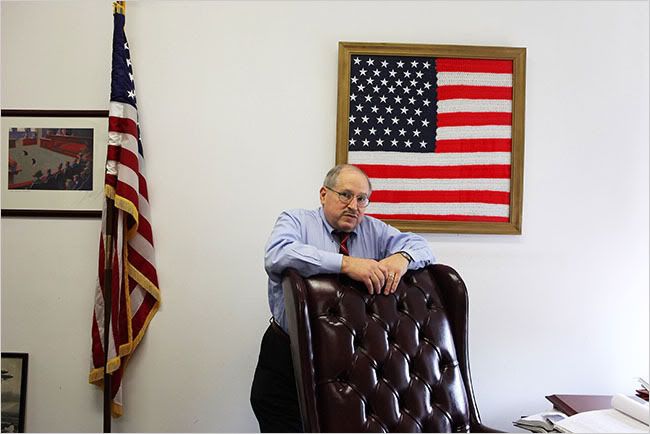Post by Jay on Sept 4, 2009 8:13:27 GMT -5

~~~~~
Every week, the nation’s mightiest banks come to his court seeking to take the homes of New Yorkers who cannot pay their mortgages. And nearly as often, the judge says, they file foreclosure papers speckled with errors.
He plucks out one motion and leafs through: a Deutsche Bank representative signed an affidavit claiming to be the vice president of two different banks. His office was in Kansas City, Mo., but the signature was notarized in Texas. And the bank did not even own the mortgage when it began to foreclose on the homeowner.
The judge’s lips pucker as if he had inhaled a pickle; he rejected this one.
“I’m a little guy in Brooklyn who doesn’t belong to their country clubs, what can I tell you?” he says, adding a shrug for punctuation. “I won’t accept their comedy of errors.”
The judge, Arthur M. Schack, 64, fashions himself a judicial Don Quixote, tilting at the phalanxes of bankers, foreclosure facilitators and lawyers who file motions by the bale. While national debate focuses on bank bailouts and federal aid for homeowners that has been slow in coming, the hard reckonings of the foreclosure crisis are being made in courts like his, and Justice Schack’s sympathies are clear.
He has tossed out 46 of the 102 foreclosure motions that have come before him in the last two years. And his often scathing decisions, peppered with allusions to the Croesus-like wealth of bank presidents, have attracted the respectful attention of judges and lawyers from Florida to Ohio to California. At recent judicial conferences in Chicago and Arizona, several panelists praised his rulings as a possible national model.
His opinions, too, have been greeted by a cry of affront from a bank official or two, who say this judge stands in the way of what is rightfully theirs. HSBC bank appealed a recent ruling, saying he had set a “dangerous precedent” by acting as “both judge and jury,” throwing out cases even when homeowners had not responded to foreclosure motions.
Justice Schack, like a handful of state and federal judges, has taken a magnifying glass to the mortgage industry. In the gilded haste of the past decade, bankers handed out millions of mortgages — with terms good, bad and exotically ugly — then repackaged those loans for sale to investors from Connecticut to Singapore. Sloppiness reigned. So many papers have been lost, signatures misplaced and documents dated inaccurately that it is often not clear which bank owns the mortgage.
Justice Schack’s take is straightforward, and sends a tremor through some bank suites: If a bank cannot prove ownership, it cannot foreclose.
“If you are going to take away someone’s house, everything should be legal and correct,” he said. “I’m a strange guy — I don’t want to put a family on the street unless it’s legitimate.”
~~~~~
“Lenders should not lose sight,” Justice Schack wrote in that 2007 case, “that they are dealing with humanity, not with Mr. Potter’s ‘rabble’ and ‘cattle.’ Multibillion-dollar corporations must follow the same rules in the foreclosure actions as the local banks, savings and loan associations or credit unions, or else they have become the Mr. Potters of the 21st century.”
Last year, he chastised Wells Fargo for filing error-filled papers. “The court,” the judge wrote, “reminds Wells Fargo of Cassius’s advice to Brutus in Act 1, Scene 2 of William Shakespeare’s ‘Julius Caesar’: ‘The fault, dear Brutus, is not in our stars, but in ourselves.’ ”
Then there is a Deutsche Bank case from 2008, the juicy part of which he reads aloud:
“The court wonders if the instant foreclosure action is a corporate ‘Kansas City Shuffle,’ a complex confidence game,” he reads. “In the 2006 film ‘Lucky Number Slevin,’ Mr. Goodkat, a hit man played by Bruce Willis, explains: ‘A Kansas City Shuffle is when everybody looks right, you go left.’ ”
The banks’ reaction? Justice Schack shrugs. “They probably curse at me,” he says, “but no one is interested in some little judge.”
~~~~~
“To the extent that judges examine these papers, they find exactly the same errors that Judge Schack does,” said Katherine M. Porter, a visiting professor at the School of Law at the University of California, Berkeley, and a national expert in consumer credit law. “His rulings are hardly revolutionary; it’s unusual only because we so rarely hold large corporations to the rules.”
www.nytimes.com/2009/08/31/nyregion/31judge.html
Every week, the nation’s mightiest banks come to his court seeking to take the homes of New Yorkers who cannot pay their mortgages. And nearly as often, the judge says, they file foreclosure papers speckled with errors.
He plucks out one motion and leafs through: a Deutsche Bank representative signed an affidavit claiming to be the vice president of two different banks. His office was in Kansas City, Mo., but the signature was notarized in Texas. And the bank did not even own the mortgage when it began to foreclose on the homeowner.
The judge’s lips pucker as if he had inhaled a pickle; he rejected this one.
“I’m a little guy in Brooklyn who doesn’t belong to their country clubs, what can I tell you?” he says, adding a shrug for punctuation. “I won’t accept their comedy of errors.”
The judge, Arthur M. Schack, 64, fashions himself a judicial Don Quixote, tilting at the phalanxes of bankers, foreclosure facilitators and lawyers who file motions by the bale. While national debate focuses on bank bailouts and federal aid for homeowners that has been slow in coming, the hard reckonings of the foreclosure crisis are being made in courts like his, and Justice Schack’s sympathies are clear.
He has tossed out 46 of the 102 foreclosure motions that have come before him in the last two years. And his often scathing decisions, peppered with allusions to the Croesus-like wealth of bank presidents, have attracted the respectful attention of judges and lawyers from Florida to Ohio to California. At recent judicial conferences in Chicago and Arizona, several panelists praised his rulings as a possible national model.
His opinions, too, have been greeted by a cry of affront from a bank official or two, who say this judge stands in the way of what is rightfully theirs. HSBC bank appealed a recent ruling, saying he had set a “dangerous precedent” by acting as “both judge and jury,” throwing out cases even when homeowners had not responded to foreclosure motions.
Justice Schack, like a handful of state and federal judges, has taken a magnifying glass to the mortgage industry. In the gilded haste of the past decade, bankers handed out millions of mortgages — with terms good, bad and exotically ugly — then repackaged those loans for sale to investors from Connecticut to Singapore. Sloppiness reigned. So many papers have been lost, signatures misplaced and documents dated inaccurately that it is often not clear which bank owns the mortgage.
Justice Schack’s take is straightforward, and sends a tremor through some bank suites: If a bank cannot prove ownership, it cannot foreclose.
“If you are going to take away someone’s house, everything should be legal and correct,” he said. “I’m a strange guy — I don’t want to put a family on the street unless it’s legitimate.”
~~~~~
“Lenders should not lose sight,” Justice Schack wrote in that 2007 case, “that they are dealing with humanity, not with Mr. Potter’s ‘rabble’ and ‘cattle.’ Multibillion-dollar corporations must follow the same rules in the foreclosure actions as the local banks, savings and loan associations or credit unions, or else they have become the Mr. Potters of the 21st century.”
Last year, he chastised Wells Fargo for filing error-filled papers. “The court,” the judge wrote, “reminds Wells Fargo of Cassius’s advice to Brutus in Act 1, Scene 2 of William Shakespeare’s ‘Julius Caesar’: ‘The fault, dear Brutus, is not in our stars, but in ourselves.’ ”
Then there is a Deutsche Bank case from 2008, the juicy part of which he reads aloud:
“The court wonders if the instant foreclosure action is a corporate ‘Kansas City Shuffle,’ a complex confidence game,” he reads. “In the 2006 film ‘Lucky Number Slevin,’ Mr. Goodkat, a hit man played by Bruce Willis, explains: ‘A Kansas City Shuffle is when everybody looks right, you go left.’ ”
The banks’ reaction? Justice Schack shrugs. “They probably curse at me,” he says, “but no one is interested in some little judge.”
~~~~~
“To the extent that judges examine these papers, they find exactly the same errors that Judge Schack does,” said Katherine M. Porter, a visiting professor at the School of Law at the University of California, Berkeley, and a national expert in consumer credit law. “His rulings are hardly revolutionary; it’s unusual only because we so rarely hold large corporations to the rules.”
www.nytimes.com/2009/08/31/nyregion/31judge.html




